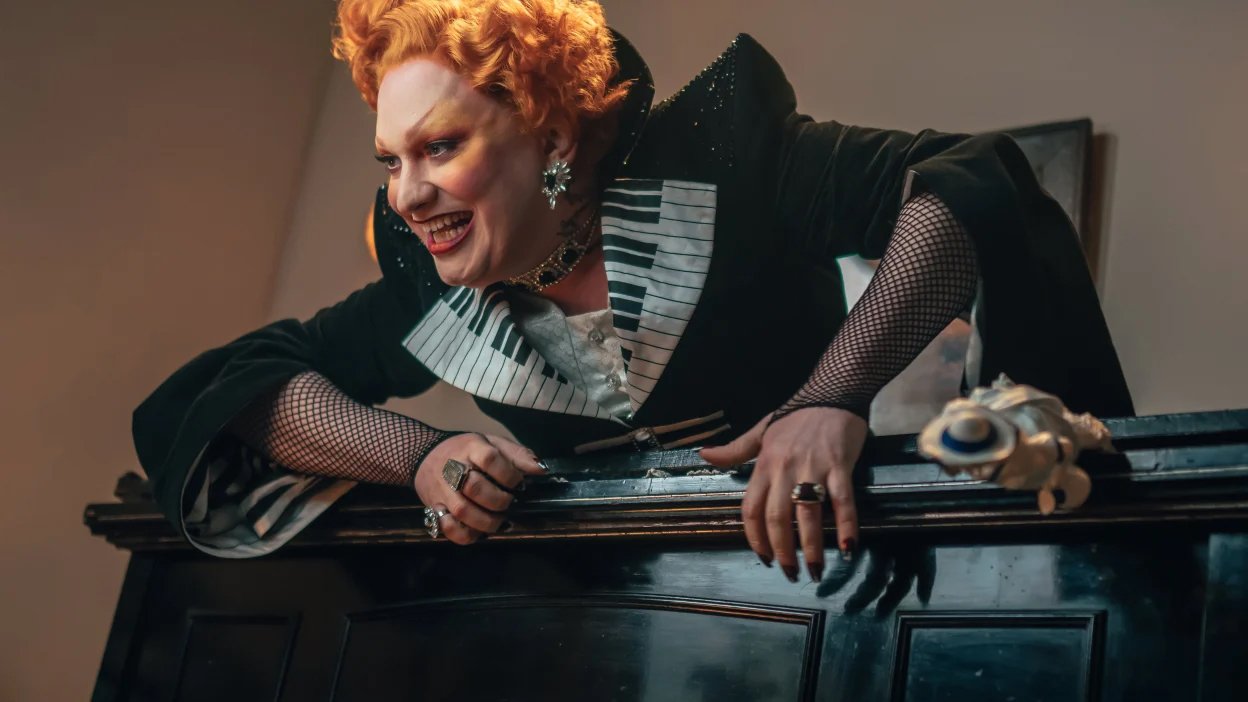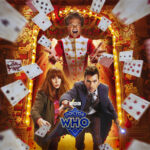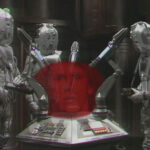The Toymaker temporarily relinquishes his confounding mock-German accent while lip-syncing to Spice Girls in Stark Tower for the conclusion of the 60th Anniversary Specials
A musical-ish episode with an actually sonic screwdriver, but no real twist at the end
Podcast: Play in new window | Embed
We co-launch into the soft reboot of Doctor Who with this second half of a re-premiere and the prospect of the long-awaited, Beatles-centric, musical extrava-gonzo. When Ruby asks to see The Beatles record their first ever album, Doc steers the TARDIS to London in 1963 — Ring any bells? — for a visit to EMI Studios.
Something’s clearly amiss with the timeline, though, as Back in the USSR, there’s been an anachronistic attack on Finland, The Beatles are rubbish, and music overall appears to have left human hearts. And what is humanity or indeed history without a hum and a whistle, or indeed an entire song-and-dance number?
Turns out, back in 1925 no-name never-existed piano teacher and one-of-a-kind musical genius Timothy Drake has discovered the so-called lost chord that summons Maestro, son of The Toymaker (the one with the German accent), and sets off the chain reaction culminating in the destruction of London, mankind and mayhap some of the 60s science fiction fandoms in-between.
Anyone so much as hum or tap their finger against the Bakelite and Maestro will show up and straight-up pop a capo in their bass cleft, yet oddly the music industry is still a thing. Presumably only The Beatles will be able to save the day, though, right? This is a Beatles episode after all, right? Or should we be dreading a twist at the end?











Star Babies was fine and funny so I’ll skip to Devil’s Chord. Missed opportunities abound here. This will be way more than 250 so cut it up however you can.
1. The music. Forget Beatles songs, how about actual good songs? Anything in the public domain would have been better than this. It starts in 1925, which means that all the music could come from before then, all of it public domain. If Paul and John cant play their own stuff, let them play a few classics that survived the purge. Fred the dog is not funny enough to justify removing good music.
2. Jinkx Monsoon. Jinkx is wasted in a role that has all the pizazz of music and none of the specificity. Music says something. It gets in your blood. It should shock and awe you. Jinkx mugging can’t make up for weak special effects and uninspired writing.
3. Swirling notes and staff effects. Make them goopy. Make them hurt as they dig in and come out of bodies. Make them change the tone of the victims’ screams. Have them break glass and rip cracks in the earth.
4. The resolution. Paul and John save the day by playing six notes on a piano in the hallway? Because of a pep talk they received earlier in the day? No. Have them be factory guys in coveralls paid to shred music and pulp instruments. Make the moment they hit the piano a chance to feel the full on physical power of music. Make it sexy. Put some sweat on their brows as they rock out on some hot jazz Jerry Lee Lewis style.
5. Final dance sequence. Move it from the hallway into the orchestra room, spilling out onto the street, and up to the roof. Hell, send them up into the sky! Music should break the heavens and shake the earth. A little soft shoe on a crosswalk that isnt even properly synced is definitely not that.
6. The inflection point in 1925. Justify why killing the piano teacher matters. Give us a montage of the roaring 20s turning into the dismal 30s and disastrous 40s, having lost the power of music to inspire courage and hope. Have some connective tissue between the first victim and Paul and John. Who is he? Their beloved piano teacher? Their greatest influence? Something. Anything. Make the kid John’s uncle or the owner of a record shop. By losing music he’s not there when Paul and John need him, thus explaining why they’re so bland now.
7. The bystanders. Show us these people jamming in the stores, singing with their kids, humming along to a little transistor radio before Jinkx kills the piano teacher. Then we see how miserable and weak they become after history is changed. Without music their lives are empty. Instead we get some RTD style reactions divorced from anything, then a cheap piano kill of an old lady.
8. The climax. We see the damn roof and all I and presumably everyone else is thinking of the Beatles playing on the roof. Set the climax up there, with the Beatles and the bystanders and everyone jamming out, the cops and crowds down below first fighting, then becoming joyful, with radiating waves of “music” effects pulsing through the city radiating outward through space as well as time, until it hits the room where the piano teacher is and Jinkx is disintegrated. By not going back to that moment, Jinkx being defeated has no clear reason for changing the past forty years and all the tension built up is sort of limply blobbing over the last ten minutes of screentime. Gosh, I’m so irritated.
Likes
It’s pretty. Millie looks hot. Some nice quiet moments. Jinkx Monsoon hamming it up.
Beefs
Literally everything else. The direction is so flat and uninteresting, like they saw the script they had and went “oh well, just shoot a few rooms and let the visual effects people make it interesting.” This feels like a script written by someone who likes music but has never tried to make it. Did anyone read it to Murray Gold before the final draft? He might have had a few punchups. It boggles my mind that they chose to make a music based episode and missed the mark so entirely. “There’s always a twist at the end”? That is factually inaccurate, regarding both Doctor Who or music in general. It’s a bad song with a bad dance sequence and I hate it. Now I’m going to watch the whole forking thing again and see if I hate it any less.
Final thought: It’s like a song where at the end of every line you think “here it comes, now it’s gonna sparkle” and it just peters out and moves to the next thing. Dull, uninspired, and limp. Just what you want in a celebration of the power of music.
Bin it.
Thanks, gang! El Jefé
PS whenever a script throws out the word genius, it rarely works out. The Doctor is canonically a genius. If he can’t solve the problem, explain who the geniuses are that can. Otherwise you’re just making us think of writers who maybe could have solved this, and you just look worse.
hi gang! here’s my devil’s chord review.
this was a strange episode for me – i really enjoyed it when i switched my brain off, but it’s not great that i had to.
likes:
– god ruby’s theme on the piano is beautiful isn’t it! murray gold is often “here’s the big companion motif! you’ll be hearing this thrice an episode for the rest of time” but this was different – complex, with sadness in it
– maestro had a great screen presence! so menacing, and my favourite part was how strangely they MOVED – it felt like they were a marionette
– i loved how the giggle came back, there was so much tension in that scene
– some fourth wall breaks were great! the doctor who theme, the harold saxon master music etc.
– one of the sonic’s coolest features in a while is one that is actually SONIC in nature
not-so-likes:
– apart from ruby’s theme, the music sucked
– john is standing at the piano, conflicted, emotional. paul comes up next to john. they both press down on the chord together. this would be alright if a) they talked at any point throughout the episode and b) they had any idea what was going on
[might be hard to read out but i’m reminded of this moment in this youtube video: https://youtu.be/Ve0TFbbUD9U?feature=shared&t=1186 – timestamp: 19:46 – 20:00]
– this episode’s placement was terrible in many ways:
the six months we’ve apparently missed
the lack of resolution to the doctor visiting ruby’s mum at christmas last episode
its proximity to another musical episode AND another episode where the doctor ran away (“you never run”????)
the fact that “the one who waits is almost here…” even though it’s only episode 2
– i HATE that line by the way, typical rtd – it doesn’t mean anything and is just meant to build tension, and besides, what does maestro have to do with the one who waits?
i really did enjoy this episode though – i would be okay giving it 3.6/5
– vamshi
Hi folks
I should have mentioned in the previous one that I watched these two after the broadcast as I was out for the day and didn’t get back till 8.30pm.
Anyway, better. Much better.
Ncuti and Millie are still great together and now with a more engaging story. A world without song would be a very dark place indeed.
Susan reference including name check? Good grief, that feels more than just casual. And the flashforward to Millie’s time is very much Sarah Jane in Pyramids of Mars.
Maestro seems an interesting villain though maybe defeated a bit too easily. That kinda spoiled the ending. Also I wasn’t sure about the end song.
My fairly instant score is 3.5/5
Cheers
Kieren
There are twelve major scales in western music. Then the pattern repeats.
Maestro Fresh Dressed drops some fat beats on The Music Man, and The Doctor and Ruby get Big whilst they strictly come dance their way on Abbey Road.
Oh yeah. And The Beatles and Cilla Black were there too.
Fate of the world and all that jazz. Mind the Fourth Wall.
This episode came very close to almost being amazing. All the notes were there. Some of the movements absolutely played. Maestro was a force of nature.
Moments of nostalgia and reflections of Susan. The granddaughter. Not the Lunch Lady.
Listen – Music is universal, right? It gets inside of you, grabs a hold and never lets you go.
It surrounds us and penetrates us. It binds the galaxy together. Sorry. Wrong IP.
We are all stories, in the end. And the story of Ruby and The Doctor has only just begun.
But if music was to suddenly disappear from the world, it should feel like it.
Like being ripped in half.
And wouldn’t The Doctor, of all people, know what that feels like?
Or remember his granddaughter, who loved listening to a handheld radio at school?
And Surprise, surprise, a missed opportunity to introduce Sheridan Smith to live-action Who.
Why would there be a music industry, if there was no music?
3.5/5 There’s always a twist at the end. Perhaps The One Who Waits is waiting somewhere between 12th and final?
(Sheridan Smith aka Lucie Miller, 8th Doctor Companion, played Cilla Black in 2014)
Hi Gang,
Well, this is more like it! Right from the off The Devil’s Chord is a blast. This story was billed as ‘The Beatles episode’ and while the actual Beatles feature very little it doesn’t matter but it’s a really good hook for the story. In true Doctor Who style it takes the movie Yesterday and gives it a great Doccy Who twist.
I’ve watched this 5 times now and each time I see more and more stuff I love. There’s no way to list all the things I like in 250 words, but a few are:
Jinkx Monsoon is magical as Maestro. Totally brilliant Doctor Who villain, I kept thinking of Graham Crowden’s performance as Soldeed in Horns of Nimon, yet where he went over the top, Jinkx kept her performance just the right side of OTT
Millie and Ncuti totally sparkle in this, right from the little boogie they do after getting changed into their 60’s clothes. Ncuti really feels like the Doctor and Millie, wow she just gets better and better. She is fast becoming my favourite companion.
Ncuti and Millie’s faces when he’s watching the Beatles and Cilla sing the awful music is priceless. Oh Cilla!
The scene where The Doctor takes Ruby to the alternate future is a great throwback to a similar scene in Pyramids of Mars.
The legendary June Hudson’s cameo is a delight.
The whole diegetic/non-diegetic music and the opening notes of the Doctor Who theme Maestro plays bleeding into the opening theme proper.
I don’t really have any beefs, on first viewing I really wasn’t sure about the dance number at the end, but just at the end of The Giggle there was Toymaker power left over that allowed 14 & 15 to split their Tardises. so it’s the same with Maestro’s power lingering that lets The Doctor and Ruby bring music and dance back to the world. I’ve seen complaints that The Beatles don’t look like The Beatles, but it’s a Doctor Who episode not a biopic. Have any of the historical characters in Doctor Who ever looked like the real people? Overall, it’s a fantastic story that brings back fun to Doctor Who.
I award this 4.7 twists at the end out of 5.
Andy Parkinson
@caffreys71
Hi Who Back When Gang!
I was going to write an introduction to my listener mini in the style of a Beatles song but after watching this episode I didn’t think it was the effort anymore, frankly!
UPS:
• Atmospheric, particularly during the London 2024 and sonic screwdriver produced silent scenes.
• I liked the music battle at the end for the most part.
• The idea of a music stealing villain who was connected to the Toymaker was a fun idea at least in concept.
• Cilla Black’s appearance was a nice touch.
• I continue to enjoy the Doctor and Ruby’s dynamic, particularly the rooftop scenes. Hopefully they might be able lift up weaker episodes going forward if need be.
• The Doctor and Ruby’s short conversation about Susan – surely the most detailed reference to Susan in New Who to date?
• Best line of dialogue: “I thought that was non-diagetic.”
DOWNS:
• Maestro was very hit and miss as a villain for me. Good introductory scene and fun in places (poor June Hudson being killed after being inspired to play the piano again) but became very over the top and grating in other moments. I’m not into drag myself so perhaps that’s a part of it but overall Maestro was a fun and interesting villain in concept but the execution didn’t really work for me, sorry.
• Subtle writing will never be RTD’s strong suit when it comes to Doctor Who, will it?
• The Beatles were incredibly underused in what was promoted as a supposedly Beatles focused episode.
• A minor note (and I did know this in advance) but a shame they couldn’t or didn’t use any Beatles songs in a (heavily promoted if nothing else) Beatles focused episode.
• Worst line of dialogue: “There’s always a twist at the end.” No, there bloody isn’t, RTD.
• The song and dance number at the end was overindulgent to me and having re-watched the sequence with subtitles on, the lyrics were nonsense as well (describing the twist as a dance and not saying much else).
RATING:
Good moments, but disappointing – maybe I built this episode up too high in my mind (The Beatles recording a song about a dog named Fred).
I actually enjoyed “Space Babies“ more than this episode.
I really am looking forward to the Steven Moffat episode more than ever now (especially after recently finishing my Capaldi re-watch in advance of this next episode).
Take care!
Adam Smart